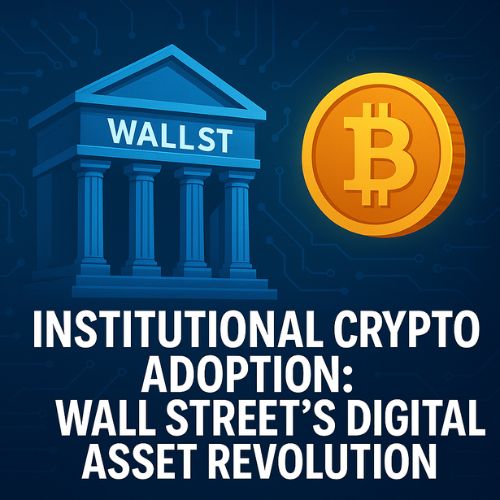Key Takeaways
- Major financial institutions are increasingly investing in cryptocurrencies
- Institutional involvement is driving market legitimacy and stability
- Regulatory clarity is accelerating corporate cryptocurrency investments
- Diversification and potential high returns attract institutional interest
- Blockchain technology offers innovative financial solutions
Introduction: The Shifting Landscape of Institutional Investment
The financial world is experiencing a profound transformation as traditional institutions progressively embrace cryptocurrency and blockchain technologies. What was once considered a speculative fringe asset class is now becoming a mainstream investment strategy for some of the world’s most sophisticated financial entities.
The Drivers of Institutional Cryptocurrency Adoption
Economic Motivations
Institutional investors are drawn to cryptocurrencies for multiple compelling reasons:
- Portfolio diversification
- Potential hedge against inflation
- Attractive risk-adjusted returns
- Exposure to emerging technological innovations
- Opportunities in digital asset ecosystems
Evolving Institutional Strategies
1. Direct Cryptocurrency Investments
Traditional financial institutions are developing sophisticated approaches to digital asset investment:
- Creating dedicated cryptocurrency investment divisions
- Allocating percentage of portfolio to digital assets
- Developing proprietary trading platforms
- Hiring blockchain and crypto specialists
- Implementing robust risk management frameworks
2. Blockchain Technology Integration
Beyond direct investments, institutions are exploring broader blockchain applications:
- Developing internal blockchain solutions
- Investing in blockchain infrastructure
- Creating cryptocurrency-related financial products
- Exploring decentralized finance (DeFi) opportunities
- Developing smart contract technologies
Notable Institutional Players and Their Strategies
Investment Banks
Major financial institutions like Goldman Sachs, JPMorgan Chase, and Morgan Stanley have:
- Launched cryptocurrency trading desks
- Offered crypto investment products
- Provided research and analytical services
- Developed cryptocurrency custody solutions
Asset Management Firms
Prominent asset managers are increasingly incorporating digital assets:
- BlackRock’s Bitcoin investment products
- Fidelity’s cryptocurrency custody services
- Vanguard’s blockchain technology research
- State Street’s digital asset platforms
Regulatory Landscape and Institutional Confidence
Regulatory Developments
Increasing regulatory clarity is driving institutional confidence:
- SEC providing clearer cryptocurrency guidelines
- Emerging global regulatory frameworks
- Enhanced compliance mechanisms
- Improved investor protection standards
Risk Mitigation Strategies
Institutions are implementing comprehensive risk management approaches:
- Advanced cybersecurity protocols
- Sophisticated trading algorithms
- Rigorous due diligence processes
- Continuous technological monitoring
- Adaptive compliance frameworks
Challenges and Considerations
While institutional adoption continues to grow, several challenges remain:
- Market volatility
- Regulatory uncertainties
- Technological complexity
- Security concerns
- Integration with traditional financial systems
Future Outlook: The Institutional Crypto Ecosystem
The trajectory of institutional cryptocurrency adoption suggests:
- Continued market maturation
- Increased mainstream acceptance
- More sophisticated investment products
- Enhanced technological infrastructure
- Greater market stability
Conclusion: A Transformative Financial Evolution
Institutional involvement represents a critical milestone in cryptocurrency’s journey from a speculative asset to a legitimate investment class. As traditional financial entities continue to explore and integrate digital assets, we can expect increasingly sophisticated and innovative approaches to emerge. This shift not only enhances the credibility of cryptocurrencies but also underscores the importance of business models in crypto, as they lay the groundwork for sustainability and growth in the sector. With institutional backing, developers are encouraged to create robust frameworks that prioritize regulatory compliance and user trust. As a result, we may witness a new wave of financial products and services that cater to a broader audience, ultimately reinforcing the stability and viability of digital assets in the global market. This evolution will likely pave the way for innovative financial instruments, such as exchange-traded funds (ETFs) that focus on cryptocurrency, providing investors with more accessible pathways to engage with digital assets. Furthermore, the ai and cryptocurrency integration could significantly enhance analytics, risk management, and trading strategies, making it easier for both institutional and retail investors to navigate this complex landscape. As these technologies converge, they may unlock new opportunities for growth and efficiency, driving mainstream adoption and further legitimizing this dynamic sector.
Disclaimer: This article provides informational insights and should not be considered financial advice. Always conduct thorough research and consult with professional financial advisors before making investment decisions.



